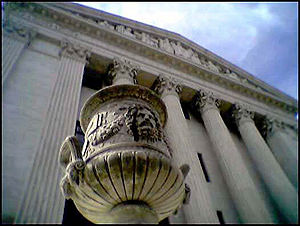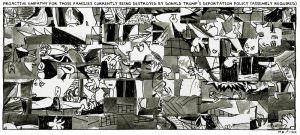Double-Flipping on ‘Identity Politics’
In my nearly two decades of covering New York's irrepressible Alfonse M. D'Amato, agreement between us was, to put it politely, rare. Yet there was one extraordinary moment when good governance and good politics collided to bring me into alliance with the former senator.
In my nearly two decades of covering New York’s irrepressible Alfonse M. D’Amato, agreement between us was, to put it politely, rare.
Yet there was one extraordinary moment when good governance and good politics collided to bring me into alliance with the former senator. It was the elevation of Sonia Sotomayor to the 2nd U.S. Circuit Court of Appeals in New York — a position that now puts her on the short list to fill the Supreme Court vacancy upon Justice David Souter’s retirement.
Sotomayor grew up in the housing projects of the Bronx, the daughter of a widowed mother who raised her two children on a nurse’s modest salary. With scholarships and at least an equal sum of self-confidence, she rose to graduate from Princeton and then Yale Law School. After graduation, Sotomayor admirably turned aside the lure of lucrative law firm life to begin her career as a prosecutor in Manhattan.
She was said to be smart, hardworking, tough-minded and personally upstanding. In 1992, Republican President George H.W. Bush nominated her to the federal district court. After an exemplary tenure as a trial judge, President Bill Clinton in 1997 sought to elevate her to the appellate bench. As was the practice at the time, both of New York’s senators, Republican D’Amato and Democrat Daniel Patrick Moynihan, teamed up to back Sotomayor.
No such bipartisan courtesy marked the response of the Senate Republican leadership. Instead, an anonymous hold was placed on what was supposed to be a routine elevation. And the GOP delayed a vote for more than a year. The reason? They believed Sotomayor’s elevation to the appeals court would give Clinton the obvious chance — should he get it — to nominate her to the Supreme Court and give the Democratic Party credit for naming the first Latina justice.
D’Amato, who by the fall of 1998 was in a tough, and ultimately losing, fight for re-election, was under intense pressure from Hispanic and other groups (and his hometown newspaper, Newsday) to shake loose the nomination. Eventually he did, through a rather vehement display of New York persistence.
I mention all this now because the airwaves crackle with talk of President Barack Obama’s obvious consideration of what is called “identity politics” in naming Souter’s replacement. Often the phrase is used with a sneer and is uttered by conservatives who claim, with perfectly straight faces, that such factors as gender and ethnicity are out of bounds.
Yet the Senate Republicans who tried to block Sotomayor’s elevation did not argue against her qualifications. Nor, for the most part, did they claim that she was too liberal. When the vote eventually was called, even Jesse Helms supported Sotomayor.
In essence, the Republicans tried to execute a double-flip of identity politics: They sought to block a qualified jurist from rising so that eventually a Republican president might get political credit for naming a Hispanic to the Supreme Court.
That George W. Bush, who was privileged to name two justices, placed two white men on the high court was not a result of his distaste for “identity politics.” His first choice to fill the seat vacated by Sandra Day O’Connor was another woman, Harriet Miers. Her nomination was doomed by conservative activists enraged that Miers had no clear track record of opposing abortion. The same activists had great enthusiasm for the nomination of African-American Clarence Thomas to fill the seat vacated by civil rights pioneer Thurgood Marshall.
The Thomas nomination is, in fact, a fine measure against which to judge right-wing indignation at Obama’s yet-to-be-named nominee.
Obama has said he will consider a person’s life struggles and capacity for empathy in making his choice, comments that already have stirred much hot air. But Thomas’ rise from a poverty-stricken community in rural Georgia to the rarefied corridors of the legal community was fundamental to the Republican marketing strategy for his nomination. “This man understands the difficulties of life,” Sen. Orrin Hatch, R-Utah, said of Thomas. “He has had a tough life but he’s made it all the way. Anybody who takes him on in the area of civil rights is taking on the grandson of a sharecropper.”
If Sotomayor is nominated, will we be told that her up-from-the-projects biography is irrelevant? Probably. Because if there is a single predictable element of judicial nomination struggles, it is that no hypocrisy is too blatant.
Marie Cocco’s e-mail address is mariecocco(at)washpost.com.
© 2009, Washington Post Writers Group
Your support matters…Independent journalism is under threat and overshadowed by heavily funded mainstream media.
You can help level the playing field. Become a member.
Your tax-deductible contribution keeps us digging beneath the headlines to give you thought-provoking, investigative reporting and analysis that unearths what's really happening- without compromise.
Give today to support our courageous, independent journalists.





You need to be a supporter to comment.
There are currently no responses to this article.
Be the first to respond.